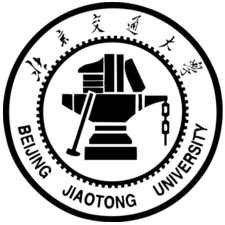Beijing Jiaotong University is a national key university under the direct administration of the Ministry of Education and now is jointly supported by the Ministry of Education, the China Railway Corporation and Beijing Municipal Government. BJTU is one of the first universities selected into the “National 211 Project” and the “985 Innovative Platforms for Key Disciplines Project”, one of the first institutions authorised to confer Master’s and Doctoral degrees. BJTU, as the leading organisation, has established the Collaborative Innovation Centre for Rail Transit Safety, which is one of the first 14 collaborative centres selected by the Chinese government into the “National 2011 Projects”. In 2017, BJTU was selected into the ‘Double First-Class’ National Initiative. BJTU will surround the advantaged disciplines and focus on building ‘Smart Transportation’ as a world-class discipline.
As one of the three origins of the Jiaotong University, the history of BJTU can be dated back to 1896. BJTU grew out of Beijing Railway Management Institute, China’s first higher educational institution which was committed to fostering railway management talents and initiated modern China’s education in railway management and telecommunication. In 1917, it was reorganized into Beijing Railway Management School and Beijing Post and Telecommunication School. In 1921, it merged with the Shanghai Industrial College, Tangshan Industrial College to form Jiaotong University. After the reorganization of Jiaotong University in 1923, the Beijing campus was renamed Beijing Jiaotong University. In 1950, the school was named Northern Jiaotong University, and the president was the famous bridge expert Mao Yisheng. In 1952, the Northern Jiaotong University was revoked, therefore, the Beijing and Tang campus became independent and the school was renamed Beijing Railway Institute. In 1970, the name Northern Jiaotong University was resumed. In 2000, it had merged with the Beijing Electric Power College and the administration was transferred from the Ministry of Railways to the Ministry of Education. In 2003, the name Beijing Jiaotong University was resumed. Some renowned people in Chinese history received education at the University, including LIU Han, the founder of China’s first radio station, YING Shangcai, the inventor of China’s first high-power steam engine, JIN Shixuan, the author of China’s first railway management monograph, XU Jing, a pioneer of railway transport economics in China, YANG Rumei, one of the earliest four major accountants in China, and ZHENG Zhenduo, a famous writer and literary critic and historian. Some famous scholars worked at the University, including Hsiang Che-chun, a Prosecutor of the Tokyo Trial and MA Yinchu, a famous demographer and economist in China.



